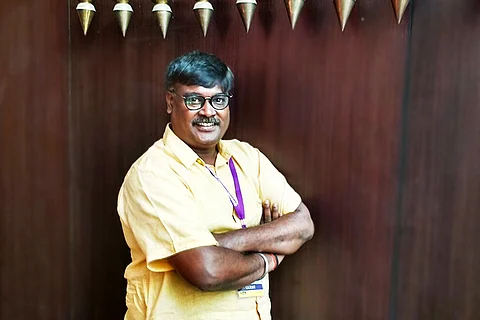

Director Dayal Padmanabhan says he has learned the one big secret of being in the movie business – how to break even. That’s by no means an easy task, he points out, when you insist on making independent films that multiplexes torpedo just after the first weekend if it’s not already a hit.
“In most multiplexes the fate of a film released on Friday is decided by Monday. They don’t have the patience. They never wait for the few days it takes for word of mouth about an independent film to spread,” he says.
It was this attitude that hurt the chances of Actor – Dayal’s latest film being screened in the Bengaluru International Film Festival (BIFFES) in the Kannada Competition Category – when it was publicly released last year. Despite this, says Dayal, he still managed a profit on Actor and his previous experimental film Haggada Kone.
With Actor, a film with just two characters, that deals with a past-his-prime actor falling into depression, Dayal is making his third appearance at BIFFES in as many years.
Of course, Dayal is much better known for films like Circus or Gharshane, the standard commercial fare that fulfills the professional requirements of his passion. But it’s also taught him how to make even his independent films commercially viable.
“You need the commercial tag to make money for survival. Experimental or parallel films don’t give you much revenue. Being a commercial filmmaker and a producer (I’ve produced six films also), I have the knack to recover the money invested in a movie,” he says.
It’s in independent filmmaking, he observes, that one gets to satisfy creative urges and make something meaningful. But, by the same token, he says, he would never want to call that his profession. “When people ask me what my profession is I tell them that I won’t answer that question, but I do make films. I do filmmaking for my satisfaction, which drives my life.”
But, points out Dayal, it isn’t as if commercial and experimental cinema divide neatly along the lines of business and art. Instead, he explains, commercial cinema is the ground where a filmmaker learns how to bring superior production values to any film. Commercial cinema, he says, teaches how to create a larger-than-life feeling within everyday constraints, particularly of time.
“For example, you go to Singapore for a shoot and take permission for shooting for 11 days. But there are three or four scenes left out. You cannot extend permissions further. So you learn the technique of making Singapore in India,” he explains.
The balance tips the other way too. If commercial cinema teaches him how to build the greater aura, he says, independent films help deliver the emotional realism that helps make commercial fare satisfying. “When I do emotional scenes, in experimental films you generally need a detailed emotional exposition. That I adopt in commercial cinema. Sometimes it works.”
Of course, says Dayal, what allows him to straddle the two worlds is that he doesn’t get caught up in the glamour of the industry. Having come to filmmaking after a 26-year career as a Junior Scientific Assistant at the Indian Institute of Science (IISc) in Bengaluru, he says his personal desires are suitably middle-class.
“I don’t have any luxurious dreams actually. I need money to eat, for my clothing, to watch cinema. Whatever minimum things I need for my life, I get from cinema... Even if I make Rs 5-10 lakh it will come for a year of my life. Though I have a name in commercial cinema, I don’t get into a luxurious life," he concludes.